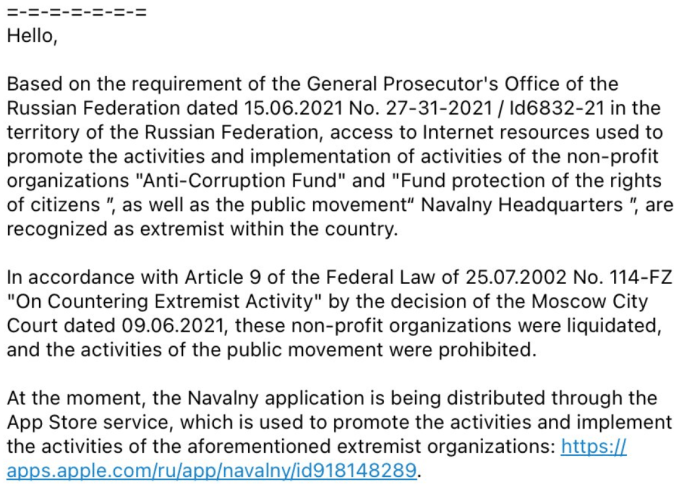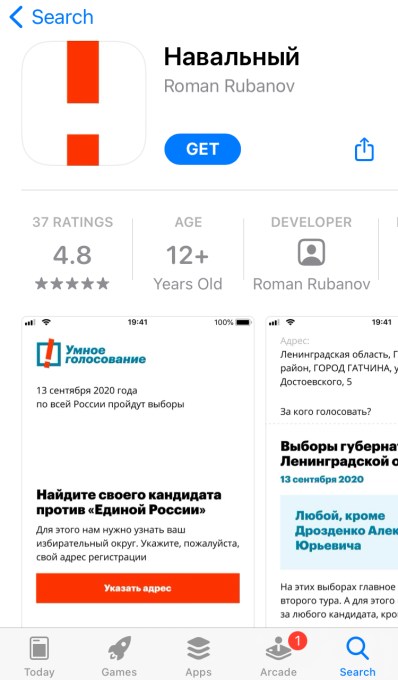Apple and Google have removed a tactical voting app created by the organization of jailed Kremlin critic, Alexei Navalny, from their respective mobile app stores in Russia.
Earlier this week Reuters reported that the Russian state had been amping up the pressure on foreign tech giants ahead of federal elections — appropriating the language of “election interference” to push US companies to censor the high profile political opponent to president Putin.
On Twitter today, a key Navalny ally, Ivan Zhdanov, tweeted that his organization is considering suing Apple and Google over removal of the apps — dubbing the act of censorship a “huge mistake”.
Zhdanov has also published what he says is Apple’s response to Team Navalny — in which the tech giant cites the Kremlin’s classification of a number of pro-Navalny organizations as “extremist” groups to justify its removal of the software.

(Image credit: Screengrab of detail from Apple’s notification to the developer, via Zhdanov’s tweet)
Apple and Google routinely say they comply with ‘all local laws’ in the countries where they operate.
However in Russia that stance means they have become complicit in acts of political censorship.
“We note that the Prosecutor’s Office of the Russian Federation and the Prosecutor’s Office of the City of Moscow have also determined that the app violates the legislation of the Russian Federation by enabling interference in elections,” Apple writes in the notification of takedown it sent to the developer of the tactical voting app.
“While your app has been removed from the Russia App Store, it is still available in the App Stores for the other territories you selected in App Store Connect,” Apple adds.
Apple and Google have been contacted for comment on the removal of Navalny’s app.
Also via Twitter, Zhdanov urged supporters to focus on the tactical voting mission — tweeting a link to a video hosted on Google-owned YouTube which contains recommendations to Russians on how to cast an anti-Putin vote in the parliamentary elections taking place today until Sunday.
Navalny’s supporters are hoping to mobilize voters across Russia to cast tactical ballots in a bid to unseat Putin by voting for whatever candidate has the best chance of defeating the ruling United Russia party.
Their tactical voting strategy has faced some criticism — given that many of the suggested alternatives are, at best, only very weakly opposed to Putin’s regime.
However Navalny’s supporters would surely point out they are having to operate within a flawed system.
After Apple and Google initially refused to remove Navalny’s ‘Smart Voting’ app, last month, the Russian state has been attempting to block access to his organization’s website.
It has even reportedly targeted Google docs — which supporters of Navalny have also been using to organize tactical voting efforts.

Screengrab of the Smart Voting app on the UK iOS app store (Image credits: Natasha Lomas/TechCrunch)
Earlier this month Reuters reported that Russia’s communications regulator, Roskomnadzor, had threatened Apple and Google with fines if they did not remove the Smart Voting app — warning that failure to comply could be interpreted as election meddling.
Russian press has also reported that Apple and Google were summoned to a meeting at the Federation Council on the eve of the election — as Putin’s regime sought to force them to do his anti-democratic bidding.
According to a report by Kommersant, the tech giants were warned the Russian Federation was preparing to tighten regulations on their businesses — and told to “come to their senses”, facing another warning that they were at a “red line”.
The last ditch effort to force the platforms to remove Navalny’s app did then pay off.
In recent weeks, Roskomnadzor has also been targeting VPN apps in the country for removal — making it hard for Russians to circumvent the local ban on Navalny’s app by accessing the software through the stores of other countries.
Local search giant, Yandex, has also reportedly been ordered not to display search results for the Smart Voting app.
Earlier this year, Putin’s regime also targeted Twitter — throttling the service for failing to remove content it wanted banned, although Roskomnadzor claimed the action was related to non-political content such as minors committing suicide, child sexual exploitation and drug use.
Source Link Apple and Google bow to pressure in Russia to remove Kremlin critic’s tactical voting app
Leave a Reply